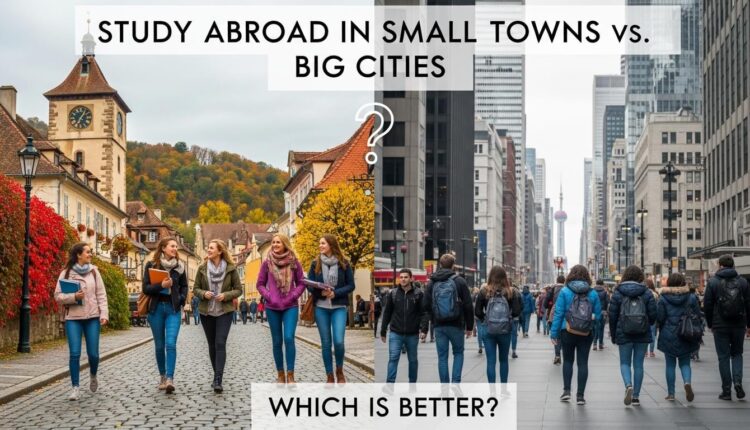Study Abroad in Small Towns vs. Big Cities — Which Is Better?
Studying abroad is often described as a life-changing adventure—a chance to experience new cultures, broaden your horizons, and build a network that spans the globe. Thousands of students are already securing spots in universities across the world, immersing themselves in foreign languages, exploring bustling city streets, or wandering through quiet, charming towns. But amid all this excitement, a subtle yet crucial question arises: are students choosing the right environment for themselves?
For many international students, the decision between studying in a big city or a small town can feel like choosing between two entirely different worlds. Big cities are often portrayed as hubs of opportunity, full of skyscrapers, cultural diversity, and professional prospects. Small towns, on the other hand, promise a slower pace, close-knit communities, and affordable living. Each comes with unique benefits—and hidden challenges.
The FOMO Factor: City Glamour vs. Small-Town Charm

The fear of missing out (FOMO) can heavily influence study-abroad decisions. Social media is filled with images of students sipping coffee in trendy cafes in Paris, attending international networking events in New York, or exploring vibrant nightlife in Tokyo. The allure is undeniable. Big cities seem to offer everything at once: education, adventure, and prestige. Students often worry that choosing a small town might mean missing these opportunities.
Yet, small towns have their own unique charms, often overlooked in global rankings and popular narratives. Picture a historic European town with cobblestone streets, a local university that knows each student by name, and a community that genuinely supports newcomers. For some, this environment can foster personal growth and academic success far beyond what a city’s fast pace allows.
Emotional and Social Challenges at a Glance
Regardless of location, international students frequently face emotional and social hurdles:
- Loneliness and social integration issues: According to the International Student Barometer 2022, over 40% of international students reported feeling isolated during their first semester abroad.
- Cultural shock: Navigating new social norms, educational systems, and communication styles can be overwhelming, particularly in high-energy cities.
- Financial stress: Living in major urban centers can strain budgets, leading to anxiety and even part-time work challenges.
- Academic pressure: Smaller towns may offer more support and closer student-faculty interactions, but fewer extracurricular opportunities can affect social confidence and networking skills.
These challenges highlight a fundamental truth: location shapes not just your lifestyle, but your social and emotional experience as a student abroad.
Why This Matters
Choosing between a bustling metropolis and a cozy town isn’t just about lifestyle preferences—it can impact your professional network, mental health, and even academic performance. The right environment aligns with your personality, career ambitions, and social comfort. Picking a location that feels exciting but incompatible with your needs can result in missed opportunities, heightened stress, and an experience that feels more overwhelming than transformative.
This guide will break down the pros, cons, and unique challenges of both small towns and big cities. By the end, you’ll be equipped with data-driven insights, research-backed advice, and practical tips to make the decision that best suits your goals.
Are you ready to explore the vibrant streets of a big city or the quiet charm of a small town? Your study abroad journey starts with understanding how your environment shapes every step of the experience.
Present the Big City Experience

Big cities are often the first choice for international students seeking energy, diversity, and career-oriented opportunities. From London’s historic universities to New York’s buzzing campus life, urban centers are portrayed as the ultimate launchpads for personal and professional growth. But while the appeal of big cities is undeniable, they bring both remarkable advantages and unique challenges that every prospective student should consider.
Population and Diversity: A Global Melting Pot
One of the defining features of big cities is their sheer size and diversity. Cities like London, Toronto, Sydney, and Berlin host hundreds of thousands of international students, creating multicultural environments where students can interact with peers from across the globe. According to UNESCO’s 2023 statistics:
- London hosts over 300,000 international students, representing more than 150 nationalities.
- New York City’s universities attract more than 200,000 international students annually.
- Cities with high cultural diversity provide exposure to multiple languages, traditions, and perspectives, helping students develop critical cross-cultural communication skills—an invaluable asset in today’s global workforce.
This diversity fosters networking opportunities, collaboration on international projects, and an understanding of global perspectives, preparing students for careers in multinational environments.
Professional Opportunities: Networking and Internships
Big cities are economic and industrial hubs, offering unmatched professional advantages. International students in urban centers often have access to:
- Internships with multinational corporations – students in cities like New York, London, or Singapore report being 30–50% more likely to secure internships compared to peers in smaller towns.
- Industry workshops and seminars – universities in metropolitan areas frequently host career fairs, professional networking events, and guest lectures from top executives.
- Job opportunities post-graduation – urban graduates benefit from immediate access to large job markets and dynamic industries.
However, this abundance comes with competition. The same professional networks that provide opportunities can also create pressure. Students may struggle to stand out among thousands of equally talented peers, and securing internships often requires early preparation and strategic networking.
Cultural Exposure and Lifestyle
City life extends beyond academics and careers—it shapes students’ social and personal experiences. Big cities offer:
- Museums, theaters, and galleries – from Broadway shows in New York to world-class exhibitions in Paris.
- Diverse cuisine, international festivals, and dynamic nightlife.
- Opportunities to join student clubs and communities catering to almost every interest imaginable.
While this environment can enrich personal growth, it may also be overwhelming. According to a 2022 International Student Wellbeing Survey, 38% of students in major cities reported feelings of stress and social fatigue, often due to high-paced lifestyles, crowded public transport, and constant social stimulation.
Common Misconceptions
- “More opportunities mean better personal growth.” Not always. While cities provide exposure, personal development depends on engagement, time management, and emotional resilience. Students who feel lost in the crowd may miss chances to form meaningful connections.
- “City living is universally exciting.” For introverted students or those unprepared for fast-paced urban life, cities can be isolating and stressful rather than stimulating.
Summary of the Big City Experience
In essence, big cities are ideal for students who thrive in energetic environments, seek global networking opportunities, and are prepared to navigate competitive professional landscapes. They offer cultural immersion, social diversity, and abundant career options—but come with high living costs, competition, and potential stress.
The next section will explore the quieter yet equally impactful world of small towns, where intimacy, affordability, and focus can create a different kind of transformative experience for international students.
Present the Small Town Experience

While big cities dazzle with skyscrapers, bustling streets, and endless opportunities, small towns offer a different, often overlooked, study abroad experience. For students seeking community, affordability, and focused academic life, small towns can provide a transformative environment that fosters personal growth and meaningful connections.
Affordability: A Major Advantage
One of the most tangible benefits of studying in a small town is the lower cost of living. Accommodation, transportation, and daily expenses in smaller towns are typically 20–40% cheaper than in major cities. For example:
- St. Andrews in Scotland offers student housing at an average of $500–$700 per month, compared to $1,200–$1,800 in Edinburgh.
- Leuven in Belgium provides affordable groceries and public transport, allowing students to maintain a comfortable lifestyle without excessive financial stress.
Lower expenses mean students can focus more on academics and social activities rather than juggling multiple part-time jobs just to make ends meet.
Community Integration and Personal Connections
Small towns often have close-knit communities where students can integrate quickly. Unlike sprawling cities where international students may feel anonymous, smaller towns provide opportunities to:
- Build meaningful friendships with peers and locals.
- Engage in community events and clubs that foster social bonds.
- Receive personalized attention from professors, as smaller class sizes allow for more direct interaction and mentorship.
According to the International Student Barometer 2022, 62% of students in small towns reported a stronger sense of belonging compared to 45% of city-based students. This sense of community can significantly reduce feelings of loneliness and social anxiety, which are common challenges for international students.
Academic Focus and Personalized Learning
Small towns often offer a more focused academic environment:
- Smaller class sizes mean more opportunities for direct engagement with instructors.
- Professors are more accessible for guidance, feedback, and mentorship.
- Students can participate in research projects or leadership roles more easily than in highly competitive city universities.
These advantages contribute to better academic performance and can enhance students’ confidence in both personal and professional spheres.
Cultural Exposure and Limitations
While small towns provide a rich cultural experience in their own right, it may not be as varied or intense as in big cities. Students may need to actively seek international exposure, such as:
- Participating in exchange programs or trips to nearby cities.
- Engaging in cultural clubs or language exchange events on campus.
- Attending regional festivals and local gatherings to experience diversity.
Contrary to popular belief, small towns are not “boring” or “career-limiting.” Many students find that the calmer environment allows them to build confidence, develop skills, and form networks that are equally valuable, even if less cosmopolitan.
Research-Backed Insights
- Students in small towns report higher satisfaction with academic support and lower stress levels.
- They often have more free time to pursue hobbies, volunteer work, and personal projects.
- Personalized attention from faculty and staff can lead to stronger mentorship and clearer career guidance.
Common Misconceptions
- “Small towns are boring or limit career prospects.” False. Students can actively pursue internships, local projects, and networking opportunities while benefiting from a less stressful environment.
- “There is no diversity.” While smaller towns may have fewer international students, many universities maintain multicultural programs and exchange initiatives that expose students to global perspectives.
Summary of the Small Town Experience
Small towns are ideal for students who value community, affordability, academic focus, and lower stress levels. While they may offer fewer professional opportunities than big cities, the personal growth, meaningful connections, and academic advantages can make small towns an excellent choice for international students seeking a balanced study-abroad experience.
Compare & Contrast — Making the Choice
After exploring the distinct experiences offered by big cities and small towns, the next step is understanding how each environment aligns with your personal goals, personality, and career aspirations. International students often find that success abroad depends not just on the university, but on the surrounding environment that shapes their social, academic, and emotional life.
Key Differences Between Big Cities and Small Towns
Here’s a clear, data-driven comparison to help visualize the trade-offs:
| Feature | Big Cities | Small Towns |
| Population & Diversity | Highly diverse, thousands of international students | Smaller student body, fewer international peers but more intimate interactions |
| Cost of Living | High (housing, transport, food) | Lower (affordable housing and daily expenses) |
| Academic Support | Large classes, less one-on-one interaction | Small classes, personalized attention from professors |
| Networking Opportunities | Numerous internships, corporate connections, industry events | Fewer large-scale opportunities, but easier to build close professional relationships locally |
| Social Life & Culture | Vibrant nightlife, cultural festivals, global cuisine | More intimate community events, local cultural immersion |
| Stress Levels | Higher due to pace, competition, and cost | Lower, more balanced lifestyle |
| Sense of Belonging | Can feel anonymous, especially at large universities | Stronger community integration, students often feel recognized and supported |
This table highlights a crucial point: choosing a big city doesn’t automatically guarantee success, and choosing a small town doesn’t mean missing out. Both settings offer distinct advantages and challenges; the right choice depends on personal priorities.
Decision-Making Prompts
To decide which environment is right for you, consider these questions:
- Personality Fit: Do you thrive in fast-paced, dynamic settings or prefer calm, familiar surroundings?
- Career Goals: Are internships, networking, and corporate exposure your top priority? Or do you value academic focus and mentorship more?
- Social Comfort: Do you enjoy large social circles and constant activity, or do you prefer tight-knit communities and meaningful one-on-one connections?
- Lifestyle Preference: Are high living costs, busy commutes, and bustling streets exciting or overwhelming for you?
Answering these questions honestly can clarify whether a city or small town will provide the best environment for your study-abroad journey.
Challenging Misconceptions
- Big cities: While often marketed as the ultimate opportunity hubs, cities can overwhelm students who are unprepared for high costs, competition, and social pressure. A city alone does not guarantee professional or personal growth.
- Small towns: Though sometimes perceived as “limiting,” small towns can provide closer mentorship, stronger community support, and more focused academic experiences. Students who engage proactively can still access internships, networking, and international exposure.
The takeaway: success abroad is shaped less by the size of the city or town, and more by how well the environment fits your personality, goals, and learning style.
Summary
Choosing where to study abroad is more than a logistical decision—it affects your social life, academic performance, emotional well-being, and career trajectory. By comparing big cities and small towns across key aspects like cost, culture, networking, and stress levels, students can make an informed choice that aligns with their personal and professional objectives.
Conclusion + Call to Adventure (CTA)
After exploring the vibrant energy of big cities and the intimate charm of small towns, one truth becomes clear: there is no one-size-fits-all answer to the study abroad dilemma. Each environment offers unique advantages and challenges that shape your academic performance, social life, emotional well-being, and career prospects. The key is aligning your choice with your goals, personality, and lifestyle preferences.
Recap: Big Cities vs. Small Towns
- Big Cities:
- Pros: Cultural diversity, abundant networking opportunities, internships, and access to professional events.
- Cons: High cost of living, intense competition, risk of social overwhelm, and potential stress from fast-paced lifestyles.
- Small Towns:
- Pros: Affordable living, strong community bonds, personalized academic support, and lower stress levels.
- Cons: Limited large-scale professional opportunities, fewer nightlife options, and less cosmopolitan exposure.
By understanding these trade-offs, students can make choices that enhance both personal growth and career readiness.
Actionable Advice for Making the Right Choice
- Research Programs Thoroughly: Look at universities’ support services, international student population, and local opportunities.
- Reach Out to Alumni: Connect with past students via forums, social media, or university networks to get firsthand insights.
- Assess Your Personality and Goals: Consider whether you thrive in fast-paced environments or prefer close-knit, supportive communities.
- Plan Financially: Factor in living costs, scholarships, and part-time work opportunities.
- Engage Proactively: Regardless of location, students who actively participate in clubs, networking events, and community activities maximize their study abroad experience.
FOMO-Driven Call to Adventure
Your study abroad journey is more than a destination—it’s a transformative experience that shapes your career, friendships, and worldview. Whether you choose the buzzing streets of a metropolis or the quiet charm of a small town, your success depends on aligning your environment with your unique goals and personality.
Ask yourself:
- Do you see yourself navigating international business events in a bustling city, building a global network of connections?
- Or do you envision learning closely with professors, forming deep friendships, and thriving in a supportive, slower-paced environment?
The choice is yours, but one thing is certain: the right environment can turn your study abroad experience from ordinary to extraordinary.
Final Thoughts – Study Abroad in Small Towns vs. Big Cities
Study abroad is not just about a university or a country—it’s about where you will live, learn, and grow. By carefully weighing the advantages and challenges of big cities versus small towns, you can design an experience that enriches your personal, academic, and professional life.
So, where will your study abroad journey take you — the electric energy of a global city or the warm embrace of a small-town community? Your adventure awaits.


